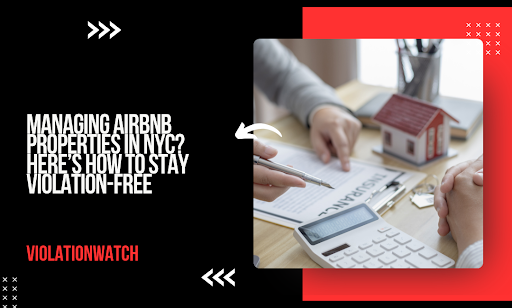You’ve heard the horror stories like:
- $5,000 fines
- Properties shut down overnight
- Years of rental income vanishing because of a single violation
Here’s what most NYC short-term rental hosts get wrong: they think staying compliant means just registering their property. Wrong. The city’s enforcement game has changed dramatically, and what worked in 2023 won’t protect you now.
NYC issued over 15,000 short-term rental violations last year alone. Each violation carries fines ranging from $1,000 to $7,500. Do the math—that’s potentially millions in penalties hitting property owners who thought they were playing by the rules. But you don’t have to become another statistic.
In this article, we’ll show you exactly how to protect your rental income:
- Register properly with the city (and why 60% of hosts mess this up)
- Master the 30-day rule without losing bookings or revenue
- Handle the host-present requirement for short stays (yes, there are workarounds)
- Use Airbnb’s platform strategically to avoid payment violations
- Enforce house rules that actually protect you from liability
- Automate compliance tracking with ViolationWatch to catch issues before they become expensive problems
These aren’t generic tips you’ll find on Reddit. This is a battle-tested compliance system based on what’s actually working for NYC property managers running vacation rentals right now.
Let’s keep your properties profitable—and violation-free.
Register Properly with the City (And Why 60% of Hosts Mess This Up)
Here’s the brutal truth: registration isn’t optional anymore. NYC’s Office of Special Enforcement (OSE) runs automated sweeps of short-term rental platforms daily. No registration? Your listing gets flagged within 48 hours. The registration process seems simple enough. Fill out the form, pay the fee, and wait for approval. So why do most hosts blow it?
They register the wrong entity. You can’t just slap your name on the application and call it done. The registered name must match exactly with:
- Your property deed
- Your Airbnb host account
- Your tax records
- Your short-term rental business entity (if applicable)
One character off? Rejected. Middle initial missing? Rejected. Did you use your LLC, but the deed shows your personal name? Rejected.
The Registration Checklist That Actually Works
Start with your Certificate of Occupancy (C of O). This document determines what registration type you need under short-term rental regulations. Pull yours from the DOB website—it’s free and takes 5 minutes.
Next, gather these documents before starting your application:
- Government-issued ID
- Proof of ownership or lease agreement
- Floor plans (yes, they check these)
- Proof of liability insurance ($1 million minimum)
Pro tip: Your insurance policy must specifically cover Airbnb rentals. Standard homeowner’s insurance won’t cut it. Get a rider or specialized STR policy—it costs about $800 more annually but saves you from denial.
Common Registration Killers
Mixed-use buildings trip up hosts constantly. Your building might be zoned commercial on the ground floor and residential above. Guess what? Different zoning laws apply to each unit. Register under the wrong category and you’re looking at immediate rejection plus a potential $1,000 fine for false information.
Building violations are another silent killer. OSE checks your property’s violation history during short-term rental registration. Got an open ECB violation from 2019? Clear it first. Even non-hazardous violations can torpedo your application.
The timeline matters too. Submit your registration at least 30 days before your first guest arrives to secure your New York short-term rental permit. The city technically has 5 business days to respond, but backlogs push this to 2-3 weeks regularly.
Master the 30-Day Rule Without Losing Bookings or Revenue
The 30-day minimum stay requirement killed traditional Airbnb hosting in NYC. Or did it? Smart hosts adapted. They’re making more money with fewer turnovers and lower operating costs. The secret? Strategic pricing and guest targeting within vacation rental laws.
The Math Behind 30-Day Stays
Traditional short-term rental: $200/night × 20 nights booked = $4,000 (minus cleaning fees every 2-3 days)
30-day rental: $130/night × 30 nights = $3,900 (one cleaning fee)
Looks like a loss until you factor in:
- 90% reduction in cleaning costs
- No gaps between bookings
- Lower utility costs (guests use resources more efficiently)
- Reduced wear and tear
Your actual profit increases by 15-20%.
Finding 30-Day Guests (They’re Everywhere)
Stop thinking, tourists. Start thinking long-term rentals for:
- Medical professionals on rotation
- Insurance claim displacements
- Corporate relocations
- Film crews
- Contract workers
- Students between housing
The goldmine? Travel nurses. NYC hospitals bring in thousands monthly. They need furnished, compliant housing accommodation for exactly 4-13 week assignments.
Create dedicated listings targeting these segments. Use keywords like “monthly rental,” “extended stay,” and “furnished monthly” in your titles. Price 20% below comparable unfurnished units—you’ll still profit more than short-term rates in the evolving short-term rental market.
Structuring Compliant Agreements
Your rental agreement needs specific language to stay legal under NYC Airbnb laws. Include:
- Minimum stay clause: “This rental agreement requires a minimum occupancy of 30 consecutive days. Early termination forfeits the security deposit.”
- Primary residence declaration: The guest must acknowledge they’re establishing temporary residency. This protects you from hotel tax liability and aligns with only primary residences.
- Utility provisions: Include utilities in the rent. Separate utility billing can trigger commercial lease regulations affecting your annual operating permit.
Handle the Host-Present Requirement for Short Stays (Yes, There Are Workarounds)
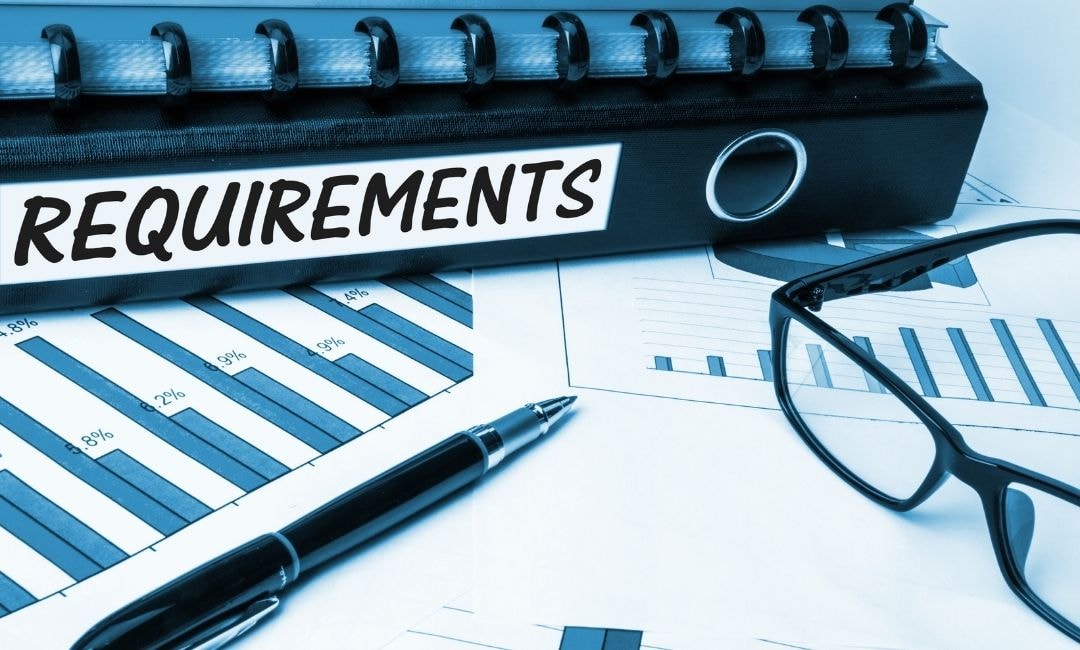
Let’s address the elephant in the room. The new law requires hosts to be physically present during any rental under 30 days. You can’t just hand over keys and disappear.
But “present” has legal flexibility under NYC Airbnb rules.
What “Present” Actually Means
According to Local Law 18, which New York City passed, present means:
- Staying in the same dwelling unit
- During the entire rental period
- With access to all common areas
Notice what’s not specified? Whether you need to interact with guests. Whether you must be home 24/7. Whether “dwelling unit” means the exact same apartment.
Legal workarounds exist for multiple dwellings. Own a brownstone with separate units? You’re present in the building. Have a legal accessory dwelling unit (ADU)? The same principle applies.
The Room Rental Strategy
Transform your listing model. Instead of renting entire apartments, rent private rooms with shared common spaces, similar to lodging houses. This satisfies the host-present requirement while maintaining guest privacy.
Set clear boundaries:
- Guests get a private bedroom and bathroom (remember: only two guests maximum in most cases)
- Kitchen access during specified hours
- Shared living room (that you rarely use)
- Separate entrances where possible
Price these 30% below whole-apartment rates. You’ll book solid while staying compliant with the NEW york Airbnb ban on whole-apartment short-term rentals.
Documentation That Protects You
Keep a host presence log. Simple spreadsheet:
- Check-in time and date
- Check-out time and date
- Host location during stay
- Brief interaction notes
Why? OSE investigators from the mayor’s office might question compliance months later. Your log proves you followed the rules. No log? You’re relying on memory against city lawyers.
Security cameras in common areas (disclosed to guests) provide additional proof. Just avoid bedrooms and bathrooms—that’s illegal regardless of disclosure under New York City local regulations.
Use Airbnb’s Platform Strategically to Avoid Payment Violations
Here’s what catches hosts off guard: accepting payments outside Airbnb isn’t just against platform rules. It’s illegal in NYC for registered short-term rentals, potentially creating illegal short-term rentals.
The city monitors payment flows through New York’s data-sharing requirements. Cash deposits, Venmo requests, or “damage deposit” workarounds trigger investigations. One report leads to $2,500 fines plus platform bans.
Platform Features That Protect You
Resolution Center handles everything:
- Security deposits (up to $5,000)
- Damage claims
- Extra guest fees (especially important with up to two guests)
- Late checkout charges
Document everything through the platform. Take photos before and after each stay. Submit claims within 14 days. Airbnb’s mediation process favors hosts with solid documentation, protecting you from multiple tax issues.
Smart Pricing tools prevent another violation source: price discrimination. NYC prohibits charging different rates based on guest demographics. Let Airbnb’s algorithm handle pricing—it’s legally defensible and optimizes revenue.
The Professional Co-host Option
Can’t meet the presence requirement? Hire a registered co-host who understands Airbnb NYC law. They must:
- Live in the same building
- Register separately with local authorities
- Be added to your Airbnb listing
Split revenue 70/30 or 80/20. You keep most profits while they handle the personnel requirements. Just ensure your co-host agreement specifies violation liability—you don’t want their mistakes becoming your fines.
Enforce House Rules That Actually Protect You from Liability of Short-Term Rentals
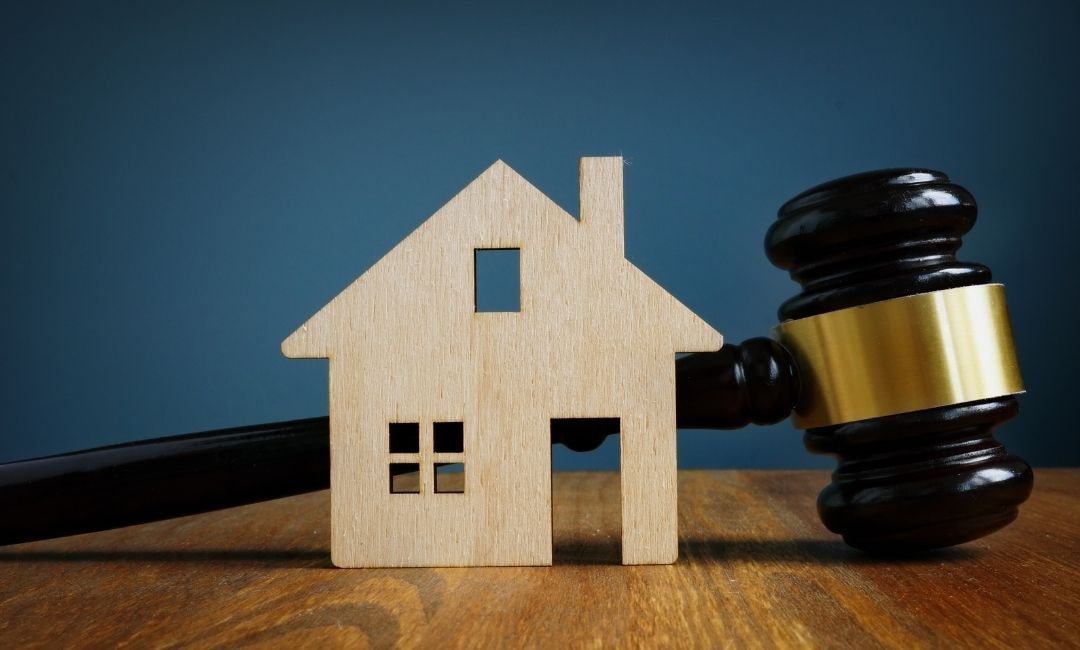
House rules aren’t suggestions. They’re legal shields against liability claims and violation notices, especially important for real estate investors in the vacation rental industry. Generic rules won’t cut it. You need specific, enforceable policies that address NYC’s unique compliance landscape.
Rules That Prevent Violations
- Occupancy limits: “Maximum 2 guests. Additional occupants constitute a lease violation and immediate eviction.” Why? NYC fire code violations start at $1,000. OSE cross-references guest counts with registration.
- Quiet hours: “No amplified sound after 10 PM or before 8 AM. Violations result in immediate termination.” Noise complaints trigger HPD inspections. Three complaints = automatic violation notice affecting your short-term rental licenses.
- No smoking: “Smoking prohibited in all areas, including outdoor spaces. $500 fee for violations.” NYC Smoke-Free Air Act fines hit $2,000. Guests smoking = your violation.
- Proper insurance disclosure: Include a statement that guests must have their own travel insurance, protecting both parties in residential buildings.
Documentation and Enforcement
Post rules in three places:
- Airbnb listing (screenshot this quarterly)
- Rental agreement (get signatures)
- Physical posting in the unit (laminated, photographed)
Triple documentation proves you informed guests. When violations occur, you show good faith compliance efforts to city officials.
The Violation Response System
Guest breaks the rules? Act within 24 hours:
- Written warning through Airbnb messaging (creates timestamp)
- Photograph evidence (noise meters, security footage, complaint letters)
- Contact Airbnb support preemptively (they note account records)
- File incident report with local precinct if needed (gets official documentation)
This paper trail shifts liability from you to the guest. City investigators see you actively enforcing compliance—that matters during violation hearings, especially for properties in class B multiple dwellings or seeking class B exemption.
Bottom line: Your house rules must be specific, posted everywhere, and enforced immediately. Passive hosts pay fines. Active hosts stay protected under the new rules.
Automate Compliance Tracking with ViolationWatch to Catch Issues Before They Become Expensive Problems
You’ve done everything right. Registered properly. Set up your 30-day minimum stays. Created bulletproof house rules. Paid your occupancy tax. But here’s the kicker—violations still slip through the cracks.
NYC issues violations across 10 different agencies. Each has its own notification system, timeline, and portal. Miss one DOB notice buried in your spam folder? That’s $5,000. Overlook an HPD inspection letter for furnished room houses? Another $1,000.
Manual tracking is a losing game. You need automation that watches your back 24/7.
Why Manual Violation Tracking Fails Every Time
Picture this scenario. You’re managing three Airbnb properties. That means checking:
- DOB’s BIS system daily
- HPD’s online portal weekly
- ECB hearing calendars are monthly
- FDNY violation searches
- DEP compliance notices
- Plus 5 more agency systems
That’s 30+ logins per week. Most hosts check maybe twice a month. Violations pile up. Fines multiply. Properties get shut down.
Other violation services? They focus on buildings, not short-term rentals. Generic building monitors miss STR-specific violations. Property management software treats violations as an afterthought—buried three menus deep with zero alerts.
How ViolationWatch Changes the Game
ViolationWatch does one thing exceptionally well: it keeps your Airbnb properties violation-free.
Here’s how it works in four simple steps:
- Step 1—Add Your Properties: It only takes 2 minutes. Enter your property addresses. The system immediately pulls violation history from all 10 NYC agencies. You see everything—current violations, resolved issues, pending hearings—on one clean dashboard monitoring your short-term listings.

- Step 2—Set Your Alert Preferences: Choose how you want notifications: WhatsApp, email, text, or all three. Pick immediate alerts for serious violations and daily summaries for minor issues. Your choice.

- Step 3—Let AI Monitor Everything: The platform’s algorithm scans agency databases continuously. Not weekly. Not daily. Every few hours. New violation posted at 3 AM? You’ll know by 3:15 AM.
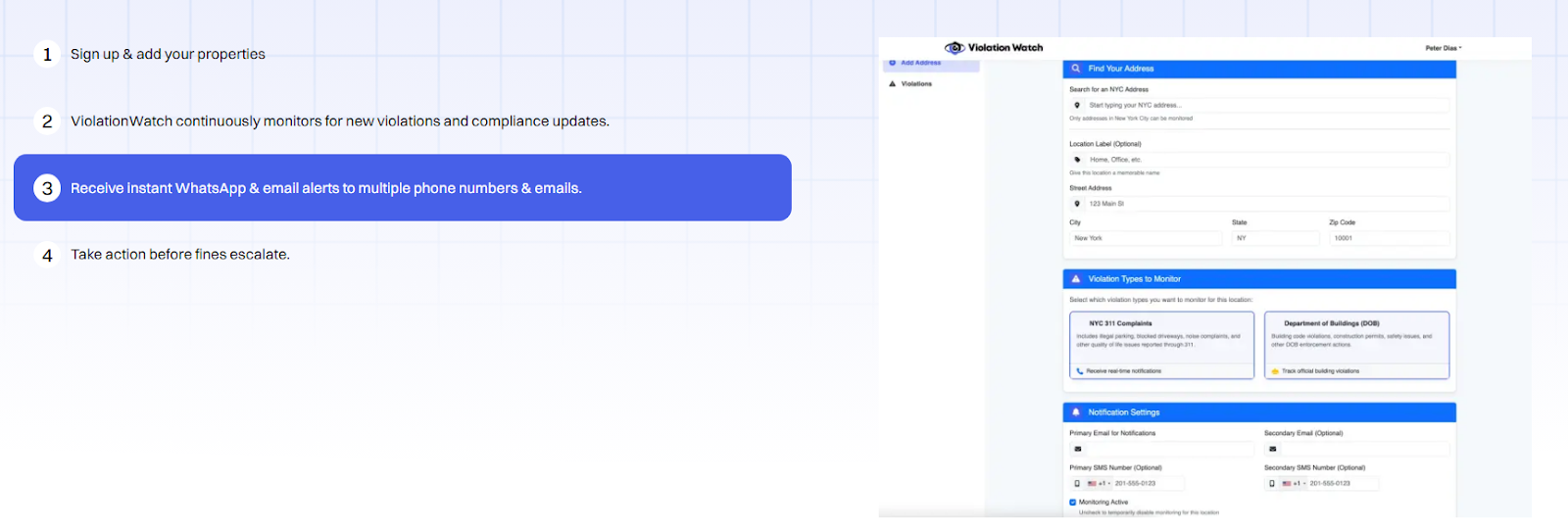
- Step 4—Fix Issues Before Fines Hit: Each alert includes exactly what to do. ECB hearing in 14 days? You get the hearing date, violation details, and resolution steps. No googling. No confusion. Just action.
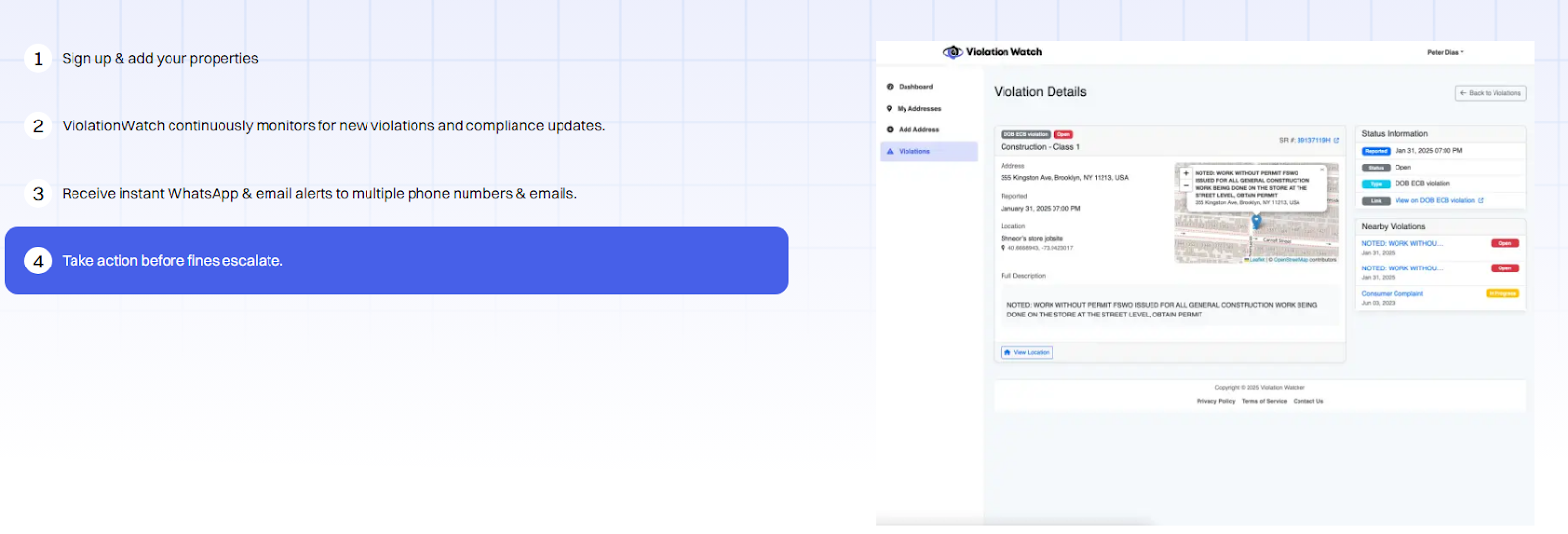
Real Numbers That Matter to Your Bottom Line
Average NYC violation fine: $2,500. ViolationWatch monthly cost: $9.99 per property. Catch just one violation early? You’ve paid for 20 years of monitoring.
The free trial lets you test everything—no credit card required. See your current violations instantly. Experience the alert system. Make an informed decision.
Built Specifically for STR Compliance
Generic property management tools treat short-term rentals like traditional accommodation establishments. Big mistake.
ViolationWatch understands STR-specific challenges:
- Registration compliance tracking
- Guest-related violation patterns
- OSE enforcement alerts
- Platform-specific requirements
The dashboard color-codes violations by urgency. Red means act today. Yellow gives you breathing room. Green shows resolved issues. One glance tells you everything.
The Hidden Benefit Nobody Talks About
Peace of mind has value. Stop waking up at 3 AM, worried about missed notices. Quit refreshing government websites during guest check-ins. End the constant anxiety about surprise inspections from the New York City Council.
Your time is worth more than $9.99 per month. How many hours do you waste checking violation sites? How much stress comes from uncertainty?
Automated monitoring gives you back both time and sanity. Focus on growing your business, not playing defense against city agencies.
Integration That Actually Makes Sense
No complex setup. No IT consultants. No training videos.
ViolationWatch works with your existing workflow:
- Forward violation notices to your unique ViolationWatch email
- Sync calendar apps for hearing reminders
- Export reports for tax prep or legal needs
- Share access with property managers or co-hosts
The platform grows with your portfolio. Managing one studio apartment? Perfect. Scaling to 20 properties? Same simple interface, just more comprehensive monitoring, ensuring class B status compliance where applicable.
Choose ViolationWatch because it’s built by people who understand NYC property compliance. Not Silicon Valley developers. Not generic software companies. NYC real estate professionals who’ve paid those fines and learned those lessons.
Your Airbnb business deserves better than crossing fingers and hoping for the best. Automate your compliance tracking. Protect your income. Sleep better at night. The question isn’t whether you need violation monitoring. It’s whether you can afford not to have it.
Keep Your NYC Rentals Violation-Free The Smart Way
You’ve just armed yourself with the exact blueprint that successful NYC Airbnb hosts use to protect their properties and income. These aren’t theoretical strategies—they’re battle-tested methods that keep properties operating smoothly while others get shut down.
Let’s recap what you’ve learned and the results you can expect:
- Strategic registration process → Avoid the 60% failure rate and get approved on your first attempt
- 30-day rental optimization → Increase profits by 15-20% while reducing operational headaches
- Legal host-presence workarounds → Stay compliant without living in your property 24/7
- Platform payment compliance → Sidestep $2,500 fines and maintain good standing with Airbnb
- Enforceable house rules → Create legal shields that shift liability away from you
- Automated violation monitoring → Catch issues within hours, not weeks, after fines accumulate
Each strategy builds on the next. Miss one piece and the whole system breaks down. But implement all six? You’re operating at a level most hosts never reach.
The difference between hosts who thrive and those who quit isn’t luck. It’s having the right systems in place. Manual tracking and hoping for the best worked in 2020. Today’s enforcement requires smarter tools.ViolationWatch fills that final gap, turning compliance from a constant worry into a background process that runs itself. Because your time should be spent growing your portfolio, not refreshing government websites. Your properties deserve protection. Your business deserves to grow. Make 2025 the year you master NYC compliance.

